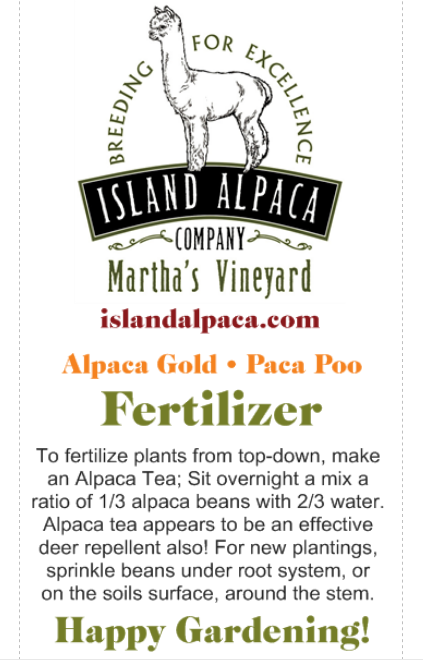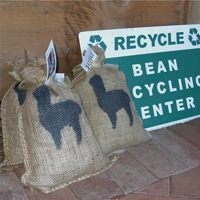 For our return & exchange policy, click here. For our return & exchange policy, click here.
Please note: Additional shipping charges may apply depending on region. We will contact you with shipping charges, should there be any additional fees, before processing your order! Bagged weight at time of packaging is as indicated. (Fertilizer is discounted on site for pick-up.)
Drying occurs, and bags may reduce in weight. Please call for bulk pricing if interested! (Hang-tag shown on right)
Island Alpaca Beans, otherwise known as "Alpaca Gold", as alpaca fertilizer makes a terrific gift for the avid gardener. You can give your friends the most unique gift and have fun doing it! An often overlooked by-product of the alpaca, the alpaca manure is one of the very best fertilizers available on the market today.
Packaged in a burlap sack, with an Island Alpaca silhouette, and a ribbon, these 2-pound and 15 pound bags*, can go a long way in the garden.
Island Alpaca fertilizer. beans are great for delicate plants and terrific for soil health. Adding it to your garden or lawn can help reduce disease and pest problems.
Organic gardeners constantly work to improve the health of their soil, Alpacas do a great job for us. They are nature’s composters. They have a marvelously efficient digestive system. They do not give any seeds the opportunity to germinate.
Alpaca Beans do not have to be "aged or cured". They will not "burn" the plants it comes in contact with and can be applied rather carelessly without fussing. It is lower in organic matter content than the manure from most other barnyard livestock (cows, horses, goats, and sheep), but still has enough to improve soil texture & water-holding capacity.
This lower organic content allows the alpaca beans to be spread directly onto plants without burning them. It is the decomposition of organic matter content of the manure that indicates their efficient digestion systems. (*Please note: Drying occurs, and bags may reduce in weight.)
ALPACA BEANS = ALPACA GOLD!
In Alpaca Beans, the nitrogen and potassium content is comparatively high, an indication of good fertilizer value. Nitrogen, phosphorus and potassium are the major plant nutrients. They are the similar to the familiar N-P-K for fertilizer, N-P-K=1.5-0.2-1.1
Phosphorus is relatively low as in most livestock manure. The Calcium and Magnesium content is average. For new plants, put beans in hole before planting.
 For seedlings, or to fertilize plants from top-down, make an Alpaca Tea; mix a ratio of 1/3 alpaca beans with 2/3 water, and let it sit over night. Alpaca tea appears to be an effective deer repellent also! Even deer don't like the smell, however to humans it is almost odorless. For seedlings, or to fertilize plants from top-down, make an Alpaca Tea; mix a ratio of 1/3 alpaca beans with 2/3 water, and let it sit over night. Alpaca tea appears to be an effective deer repellent also! Even deer don't like the smell, however to humans it is almost odorless.
Bonsai tree growers seem to love it! Island Alpaca harvests the alpaca beans daily. If they run low, we wait for the alpaca to do their business!
Have a bag of "Alpaca Gold" shipped to you today!
**Special note.. Weight appx. 2 and 15 pounds. Drying occurs and weight may change.
Alpaca Manure Vs. Others an Alpaca Manure Comparison:
There is a large range of natural fertilizers available on the market today.
Try not to be misled by the N-P-K numbers that suggest manure is less powerful than chemicals. Values of manure and organic fertilizers in general, are often based on the relative amount of nitrogen (N), phosphoric acid (P) and potash (K) they contain. While these are important elements, it is misleading to make a direct comparison between farm manures and chemical fertilizers on the simple basis of the relative amounts of N-P-K.
Alpaca Manure (1.7-.69-1.2) Alpaca Compost has the highest N-P-K of any natural fertilizer. It is lower in organic matter content than the manure from most other barnyard livestock (cows, horses, goats and sheep) creating a higher concentration of nutrients as well as improves soil texture and water-holding capacity. This lower organic content allows alpaca manure to be spread directly onto plants without burning them. It is the decomposition of organic matter content of the manure that indicates their efficient digestion system. The nitrogen and potassium content of alpaca dung is comparatively high, an indication of good fertilizer value.
Other Natural Fertilizers:
Bird Manures - Bird manures tend to be "hotter", where the plants can be burned easily if overused. Overall they are much richer in many nutrients, especially nitrogen, which marijuana plants require in their veg phase in copious amounts. But not the flower phase, thus this type of fertilizer use is limited.
Chicken Manure (1.1-1.4-0.6) - is common among farmers. It's high in nitrogen, (great for vegging plants not flowering), but can easily burn plants unless composted first. A small amount of dried chicken manure can be mixed in small concentrations directly into soil. Chicken manure is also a common ingredient in some mushroom compost recipes. One potential concern for the budding organic farmer, is the large amount of antibiotics fed to domestic fowl in large production facilities. It is also suggested that some caution should be used when handling chicken droppings, whether fresh or dried.
Poultry Manures (1.1-1.4-0.6) - are often simply chicken droppings mixed with the droppings of other domesticated birds including duck, pigeon, and turkey. They are "hotter" than most animal droppings, and in general they can be treated like chicken manure. Animal Manures vary by species, and also depending of how the animals are kept and manures are collected. Urine contains a large percentage of nitrogen and potassium. This means that animals boarded in a fashion where urine is absorbed with their feces (by straw or other similar bedding), can produce organic compost that is richer in nutrients.
Cattle Manure (0.6-0.2-0.5) - Steer manure is one of the old standbys, but it's not the most beloved because it often contains unwanted salts and weed seeds. It is considered "cold" manure since it is moister and less concentrated than most other animal manure. It breaks down and gives off nutrients fairly slowly. It can be an especially good source of beneficial bacteria, because of the complex bovine digestive system. Recent expansion in the use of bovine growth hormones to increase milk production certainly could become a concern for organic farmers trying to source safe cattle manures. The healthier the cow, and the healthier the cow's diet, the more nutrients its manure will carry.
Goat Manure (0.7-0.3-0.9) - can be treated in a similar fashion to sheep dung or horse manure. It is usually fairly dry and rich and is a "hot" manure (therefore best composted before use).
Horse Manure (0.7-0.3-0.6) - Horse manure is about half as rich as chicken manure, but richer in nitrogen than cow manure. And, like chicken droppings, it's considered "hot". Horse manure often contains a lot of weed seeds, which means it's a good idea to compost it using a hot composting method. Some sources of mushroom compost contain large quantities of horse manure and bedding in their mix. So from one standpoint, horses manure use in herb growing is already fairly well documented.
Pig Manure (0.5-0.3-0.5) - is highly concentrated or "hot" manure. It is less rich in nitrogen than horse or bird crap, but stronger than many of the other animal manures. Pig manure is best used when mixed and composted with other manures and/or large quantities of vegetable matter.
Rabbit Manure (2.4-1.4-0.6) - is the hottest of the animal manures. It may even be higher in nitrogen than some poultry manures. As an added bonus it also contains fairly high percentages of phosphates. Because of it's high nitrogen content, rabbit crap is best used in small quantities lightly mixed into soil or composted before use.
Sheep Manure (0.7-0.3-0.9) - is another "hot" manure. It is somewhat dry and very rich. Manure from sheep fed hay and grain will be more potent than manure from animals that live on pasture.
** Livestock information provided by Alpacas of Montana
For our return & exchange policy, click here.
Free shipping for all orders over $100!
|


 For our return & exchange policy, click
For our return & exchange policy, click  For seedlings, or to fertilize plants from top-down, make an Alpaca Tea; mix a ratio of 1/3 alpaca beans with 2/3 water, and let it sit over night. Alpaca tea appears to be an effective deer repellent also! Even deer don't like the smell, however to humans it is almost odorless.
For seedlings, or to fertilize plants from top-down, make an Alpaca Tea; mix a ratio of 1/3 alpaca beans with 2/3 water, and let it sit over night. Alpaca tea appears to be an effective deer repellent also! Even deer don't like the smell, however to humans it is almost odorless.